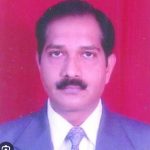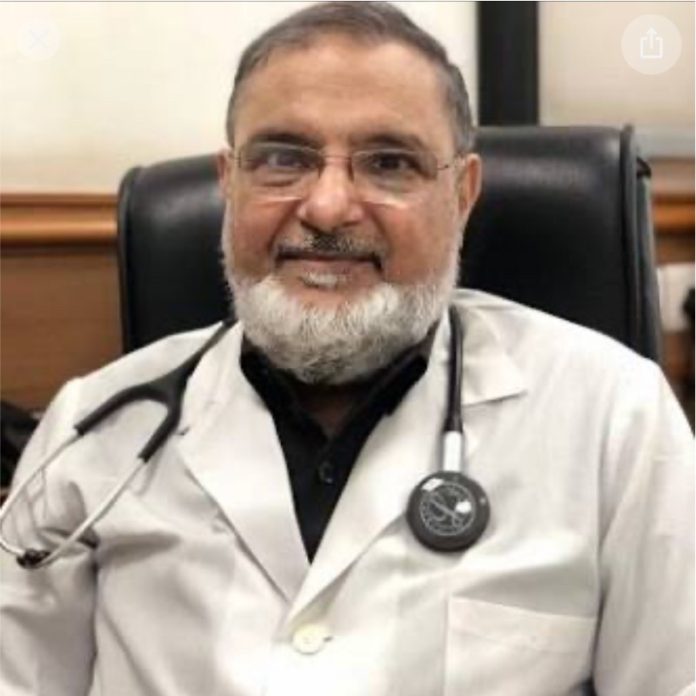Dr M Wali has a mindboggling list of awards and distinctions. He has published more than 120 book chapters and papers in reputed journals and textbooks of Medicine and Cardiology.

– Mohd Naushad Khan
Padmashri Professor Dr M Wali has served government of India for 38 years. He is recipient of prestigious fellowship of American College of Cardiology (FACC). During this illustrious career he has been a keen researcher, astute teacher and very competent Clinician.
He has discharged his services at Prestigious Ram Manohar Lohia Hospital and Post Graduate Institute which is now Atal Bihari Vajpayee Medical College, GB Pant Institute of Cardiothoracic and Vascular Sciences and President Estate Clinic, where he has served as a full time Physician to Presidents R Venkataraman, Dr Shankar Dayal Sharma and Pranab Mukherjee. This is a very unique, singular, distinguished and exemplary record.
Dr Wali has a mindboggling list of awards and distinctions. He has published more than 120 book chapters and papers in reputed journals and textbooks of Medicine and Cardiology.
His thesis on lipid metabolism was adjusted the best. The President of India has bestowed upon him Best Alumnus of Kanpur University. He has been decorated by President APJ Abdul Kalam with Padma Shri which is fourth civilian Honour of the country along with Indian Red Cross Medal for his personal attributes.
He has been a member of CCRUM and supervised more than 20 theses in Unani medicine. He always promotes Indian system of Medicine and encourages Unani medicine and its research. Arjuna in heart care is very dear to him.
Dr Wali has been twice honoured with best physician by Union Health Minister and has been bestowed with Hakim Ajmal Khan Global Award and Lifetime Achievement Award in Unani Medicine also. Above all, Dr Wali is a very humble person ready to always help the less-privileged.
He is proudly sharing his knowledge and experience at Sir Ganga Ram Hospital in New Delhi.
Dr Wali, while speaking to Radiance, said, “Cardiology in India has been always at a very advanced stage, because we stick to basics. Our teachers have been trained abroad and they were mostly trained in the United Kingdom and we are not lagging far behind any other country. Indian doctors are best in cardiology and they have made their dent throughout the world. I have to quote an incidence when I was in Mayo clinic, the American doctor heading myeloma division needed a pacemaker implant and he mentioned it to Mr VP Singh whom I was accompanying, that he was going to get his pacemaker implant by Indian doctors because Indian doctors are the best. So, this is a statement of one of the best medical centres in America.”
On the advancement in the field of Cardiology, Dr Wali said, “Cardiology during the recent days, has made a lot of advancements and we have mastered new methods of valve replacement, cardioverter pacemaker implantations, defibrillators, use of drones in transporting these ventricular devices and many more things, we also are doing buttonhole coronary bypass surgery. We are using newer anti-platelet and world’s best blood thinners. Our patients are doing very well and we are now trying to fight out with the menace of sudden cardiac deaths, most of the diseases of this segment in cardiology are actively treated in India and with a very good success rate. But sadly, our Indian coronary heart disease is progressing in young adults. For that, we have to really modify our lifestyle, food habits, sleep patterns, alcohol intake and especially quitting smoking.”
Dr Wali added, “Here are certain new modalities which are being practiced in cardiology and I would briefly mention about each of them. In the past, open heart surgery was the only way to replace an unhealthy valve. TAVI (Trancecatheter Aortic Valve Implantation) was approved in 2008 as an alternative treatment option for people with severe aortic stenosis. Intravascular ultrasound (IVUS) is a valuable adjunct to angiography, providing new insights in the diagnosis of and therapy for coronary disease. Intravascular ultrasound (IVUS) is an invasive tomographic imaging modality, providing images of coronary arteries and other blood vessels.
“Researchers reported that prolonged monitoring sessions with a Holter-ECG detected more atrial fibrillation after stroke at three and six months compared with standard care, routinely done. Rotational Atherectomy is a therapy performed with a small rotating cutting blade which is used to open a blocked artery and revamp the flow of blood to or from the heart. In high-surgical-risk elderly patients, plaque modification with RA in PCI of heavily-calcified LMCA could be safely accomplished with a minimal complication rate and low out-of-hospital MACE.”
“An implantable cardioverter-defibrillator (ICD) is a small battery-powered device placed in the chest. It can detect dangerously fast heartbeats and give a lifesaving shock to correct the heart’s rhythm. Cardiac Imaging through Combined PET/MRI has the potential to assist in the diagnosis and management of many cardiovascular conditions, such as ischemic heart disease, infiltrative cardiomyopathies, inflammatory disorders, and cardiac tumors, and is very economical in India. Recently, novel anticoagulant agents, such as the direct thrombin inhibitor dabigatran etexilate and the direct factor Xa inhibitors rivaroxaban and apixaban, have demonstrated efficacy and safety in the prevention and treatment of both arterial and venous thromboembolism in phase 3 randomized placebo-controlled trials,” said the renowned Cardiologist.
“An automated external defibrillator (AED) is a lightweight, portable device. It delivers an electric shock through the chest to the heart when it detects an abnormal rhythm and changes the rhythm back to normal. AEDs help people who have a sudden cardiac arrest, which occurs when the heart suddenly stops beating regularly. This happens when the heart’s natural electrical system doesn’t work correctly. If not treated within minutes, cardiac arrest quickly leads to death. Laser angioplasty is based on a mechanism of tissue ablation involving the disobliteration of occluded or stenosed arteries using laser radiation. Laser coronary angioplasty was introduced in the early 1980s, mainly to manage balloon-untreatable coronary artery lesions,” Dr Wali informed.
“Laser therapy in selective patients under three heads (a) Transmyocardial laser revascularization (TMLR), (b) Laser vascular anastomosis, (c) Laser angioplasty in the peripheral arterial diseases is also comfortably done. Minimally invasive heart surgery (MICS) or commonly known as Keyhole Heart Surgery is the latest and most advanced form of cardiac bypass surgery. It is performed by making small incision in the left or right side of the chest. So, these are some of the examples how successfully we are dealing with cardiac disease even in new born till the last day of human life. We are also doing cardiac transplants in selected hospitals routinely,” said the noted Cardiologist of India.
Robotic surgeries are also routinely done in India’s many leading hospitals. We are also using ECMO, which is a latest bypass reparative method for very sick patients, he added.




